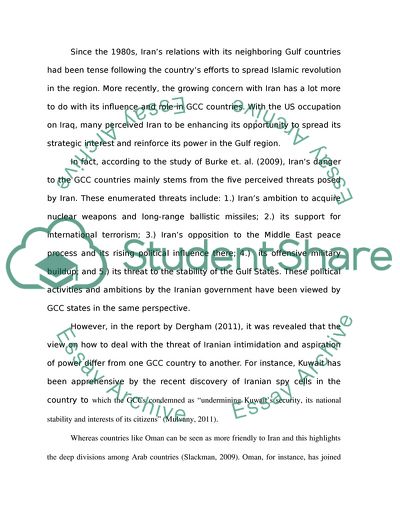Cite this document
(Relations Between Iran and the GCC: Less Growth and More Global Tension Research Paper Example | Topics and Well Written Essays - 1250 words, n.d.)
Relations Between Iran and the GCC: Less Growth and More Global Tension Research Paper Example | Topics and Well Written Essays - 1250 words. https://studentshare.org/politics/1758531-the-danger-of-iran-on-the-gulf-cooperation-council-countries
Relations Between Iran and the GCC: Less Growth and More Global Tension Research Paper Example | Topics and Well Written Essays - 1250 words. https://studentshare.org/politics/1758531-the-danger-of-iran-on-the-gulf-cooperation-council-countries
(Relations Between Iran and the GCC: Less Growth and More Global Tension Research Paper Example | Topics and Well Written Essays - 1250 Words)
Relations Between Iran and the GCC: Less Growth and More Global Tension Research Paper Example | Topics and Well Written Essays - 1250 Words. https://studentshare.org/politics/1758531-the-danger-of-iran-on-the-gulf-cooperation-council-countries.
Relations Between Iran and the GCC: Less Growth and More Global Tension Research Paper Example | Topics and Well Written Essays - 1250 Words. https://studentshare.org/politics/1758531-the-danger-of-iran-on-the-gulf-cooperation-council-countries.
“Relations Between Iran and the GCC: Less Growth and More Global Tension Research Paper Example | Topics and Well Written Essays - 1250 Words”. https://studentshare.org/politics/1758531-the-danger-of-iran-on-the-gulf-cooperation-council-countries.


